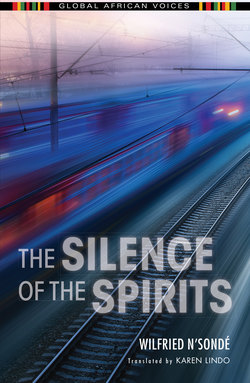Читать книгу The Silence of the Spirits - Wilfried N'Sondé - Страница 14
На сайте Литреса книга снята с продажи.
ОглавлениеCHRISTELLE HAD TAKEN me in by chance during a suburban train ride. She admitted to having rescued me out of compassion as you might do for a wounded animal suffering on the roadside. She had forgotten her own worries, escaped from her own labyrinth of anxieties and boredom to take care of me, an illegal immigrant, far more destitute than she.
After her shift had ended on the day we met, she had rushed and taken a quick shower, dressed quickly so that she would not miss the bus. She arrived out of breath, but it had been too late. Disappointed, she decided to head to the train station on foot, enjoy a little walk and take advantage of the afternoon. After all, what was the rush? No one was waiting for her at home. She strolled along the Boulevard de l’Hôpital, congested with pedestrians and cars. As she was crossing the Pont d’Austerlitz, she saw me for the first time. She was immediately moved by my deep sad expression. Christelle thought I might have been lost in a dream. With my fist beneath my chin, I was peering at all the frozen garbage being carried along by the Seine on that February day. Christelle saw me as a man alone in the middle of nowhere, cowering into his skin, wishing his head would disappear into his shoulders. Today, when she remembers how poorly I was dressed, she smiles. She had felt an incredible sadness for me.
Christelle casually continued on her way to Gare de Lyon. She was welcomed into the anonymous, hurried mass of commuters, whose eardrums are overwhelmed by the chaotic concert of announcements and information spewing out of loudspeakers, accompanied by the noise of shoes beating the floor in a steady rhythm. In this familiar setting, Christelle acted by instinct, walking as she usually would, head down, back slightly bent, accustomed to the mask of rush hour on exhausted faces with no smiles that kept moving past her. An interminable parade of features, colors, clothes, sizes, thousands of destinies meeting for a fraction of a second, blank stares colliding for an instant and then ignoring each other forever. Every day, Christelle heard the depressing echo of these silences. She kept walking, her pace dictated by the hustle and bustle of the crowd. Dazzled by the overpowering, blinding neon lights, she squinted and then looked up to verify the times. Always on the move, a prisoner of the rapid chaotic swell. Impossible to stop herself. The clickety clack of train stations going by at an unheard-of pace on the display panel until it suddenly stopped on a destination, a number or a letter indicating the platform. At the shrill sound of the train horn, a human tide would converge on the same escalator. Christelle participated in this merciless mad rush twice a day. It worked. Everyone just got swallowed up by cars in haphazard gulps, a chaotic ballet of automatons, exhausted from their daily work.
The crowd carried Christelle to the train that was waiting for her. Accustomed to the routine, she was among the first to enter and quickly find a seat. Discreet, never wanting to disturb anyone, she found a seat in the middle of the car, farthest away from the draft. She sat with her back to the direction in which the train was traveling. She sank all the weight of her exhausted body onto the seat, ready to savor the ever-so-slight feeling of getting away.
She was surprised when she recognized the melancholic young man she had passed on the Pont d’Austerlitz much earlier.
I was sitting in front of her, terrified, with even more pain and bitterness in my expression. She saw that I was frightened! Christelle carefully scrutinized my tormented face and my pupils, dilated from anxiety, then closed her eyes.
